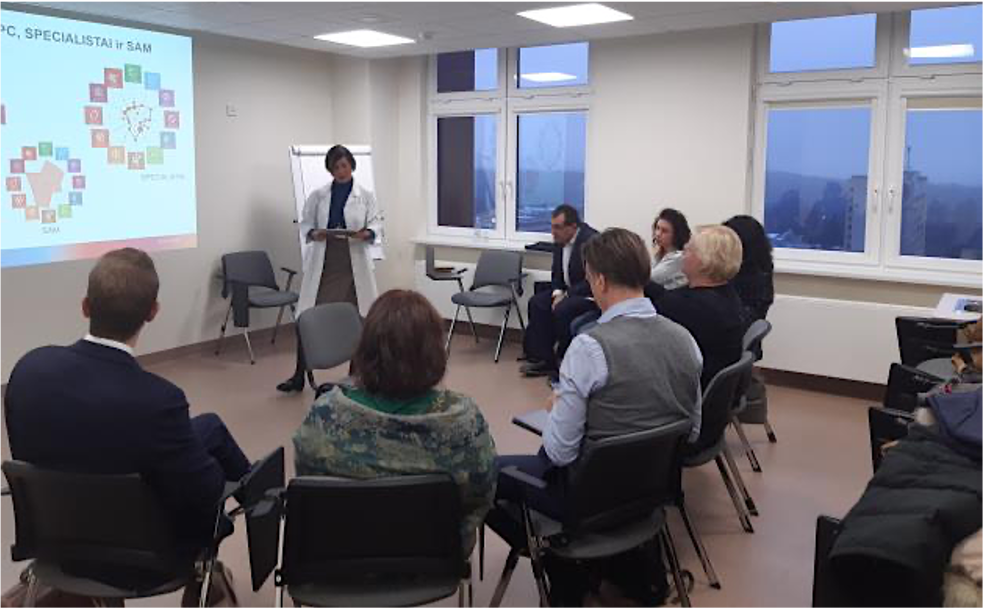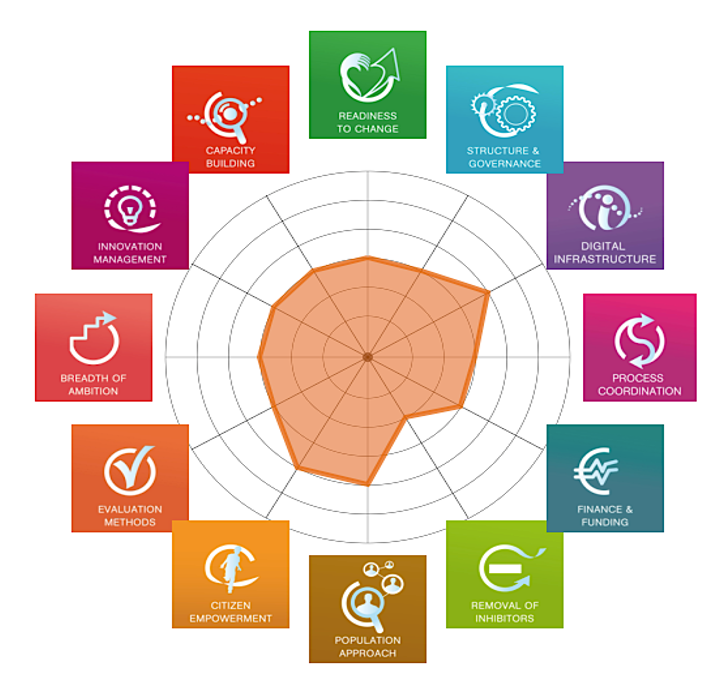Maturity Assessment Process - Lithuania
The organisation responsible for the self-assessment process is:
• Vilnius University Hospital Santaros Klinikos (VULSK) Vilnius University and the Lithuanian Ministry of Health are the founders of Santaros Klinikos.
The region
The organisation of the healthcare system in Lithuania is governed by the Ministry of Health (MoH) and the National Health Insurance Fund (NHIF), with local administrations delivering services. Insurance coverage is provided to the population by the NHIF. In order to obtain coverage, the active population must contribute to the NHIF. The economically inactive, including children and students, pensioners and the unemployed, constituting 54% of the population in 2016 are automatically covered. Municipalities own a large share of the primary care centres, polyclinics, and small-to-medium sized hospitals. They are also responsible delivering public health activities.
One of the main priorities in Lithuania is to strengthen public health services at local level. A functional integration of primary health care and public health surveillance activities started in 2015. Legislation to develop models on integrated care is approved by the government, but there are still challenges to overcome in practice. Integrated care in Lithuania is taking its first steps.
In 21 municipalities, 70 mobile teams provide integrated services (nursing and social care) at home, including support to their informal care givers. Primary health care prevention programs are being developed, and healthy lifestyle specialists are integrated into family health centers. There is a particular focus on e-health, remote consultations and image sharing.
Maturity Assessment for Integrated Care
The maturity assessment process was fully conducted in Lithuanian and the scope of the assessment consisted of 4 stakeholders’ groups.
The process comprised the following stages:
The SCIROCCO Exchange Tool was translated into Lithuanian language in July 2019 and a webinar was delivered to stakeholders describing the self-assessment process.
a) the individual self-assessment was carried out by the stakeholders.
b) a consensus workshop with all the stakeholders face-to-face was held in December 2019.

Strengths and Weaknesses identified through the Maturity Assessment process
Similar to each of the SCIROCCO Exchange Partners, the results for each dimension can be different depending on the perspective of the staff groups who are participating. The Lithuanian partners sought a more in-depth understanding of the different perspectives and have presented their outputs to reflect this. This is why the consensus workshop is a crucial step in the process of understanding the maturity level.
Primary Health Care Centres (PHCC) and Medical Doctors - three dimensions ranked as strengths during this process:
- Digital Infrastructure
- Population approach
- Breadth of ambition.
PHCC and Medical Doctors - three dimensions ranked as weaknesses:
- Finance and funding
- Evaluation Methods
- Breadth of ambition.
Ministry of Health and Patients - dimensions identified as strengths
- Readiness to Change
- Population approach
- Citizen Empowerment
- Innovation Management
Ministry of Health and Patients - dimensions identified as weaknesses
- Removal of Inhibitors
- Process Coordination
- Capacity Building
During the consensus-building process based on the total results of the self-assessment survey before the workshop, all the 12 dimensions were discussed thoroughly, especially those with the most significant differences in scoring and the consensus was built. The outcomes of the self-assessment reflect the overall maturity, even though the results vary considerably between the groups.The following three dimensions were highlighted as priority dimensions for the beginning of changes:
- Process Coordination
- Removal of inhibitors
- Capacity Building.
The self-assessment process facilitated discussion among different levels of stakeholder groups. As we can see, the different stakeholders’ involvement allows reflection from different angles. Having these discussions helps to align theoretical integrated care implementation process with current practice and highlights where maturity for integrated care is not high enough and requires to take further actions.

The spider diagram illustrates the outcomes of the final consensus on the maturity for integrated care in Lithuania.


The project SCIROCCO Exchange is co-funded by the Health Programme of the European Union under Grant Agreement 826676 (Chafea)


